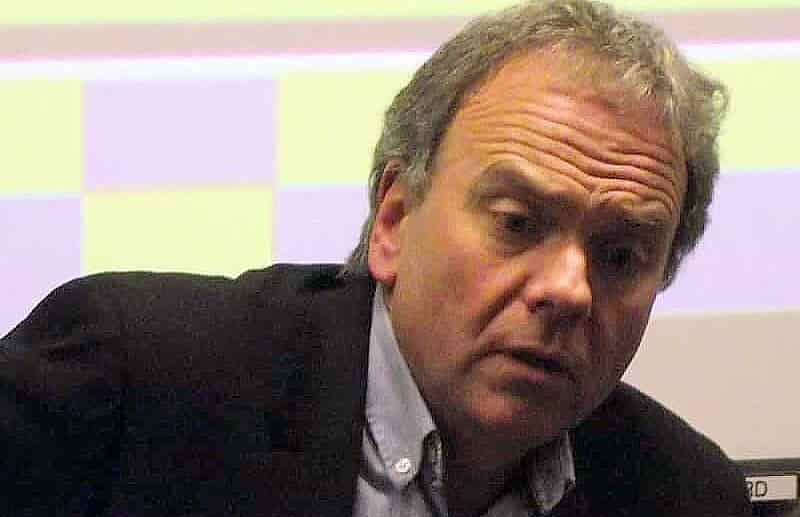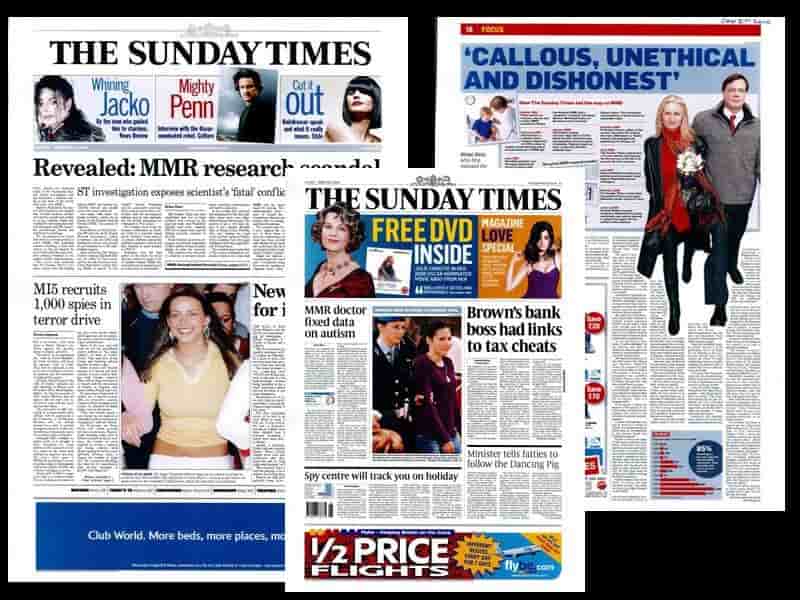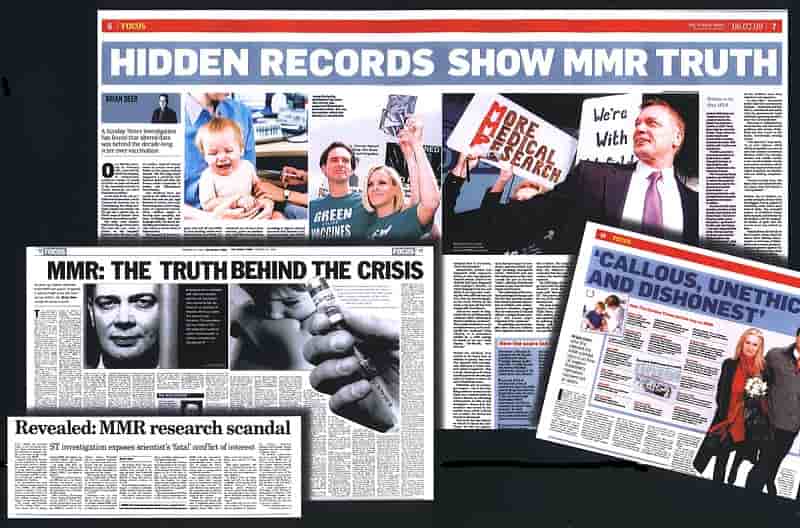
Matthews bags minor TV award with journalism he blocked then copied
Quicksilver Media’s Eamonn Matthews
buried vaccine fraud investigation
In November 2021 the Association for International Broadcasting declared “The Anti-Vax Conspiracy,” produced by Eamonn Matthews, Dinah Lord, and Flora Bagenal, to be its “investigative documentary” of the year. Here’s the second part of my complaint alleging plagiarism and misconduct behind the programme
[The first, focused on Caravan Media, is here]
OPINION BY BRIAN DEER
April 3, 2022
EAMONN MATTHEWS gloated in victory. Having long ago sabotaged my investigation of the Andrew Wakefield vaccine research fraud — delaying revelations impacting the safety of children — he’d returned years later with what I say are plagiarism and falsehood, then bragged of winning a prize:
The Anti-Vax Conspiracy (View on All4) has won the award for Investigative Documentary of the year at the 2021 Association of International Broadcasters awards. This 90′ feature was directed by Colette Camden and produced by Flora Bagenal and was a collaboration with Caravan Media for C4/ARTE. As well as the UK, it’s being aired across Europe. The Observer says it’s “startling …this fine documentary exposes why the anti-vax industry does what it does” and that the film ” unpacked a new punch every few minutes”.
Being the man that he is, Matthews didn’t even get the name right for the source of the award he celebrated. The “Association of International Broadcasters,” as he presented it on his website, was the obscure Association for International Broadcasting. And behind his delight was a darker achievement: the submission by Channel 4 of a programme rife with journalism harvested from mine without acknowledgment — as he’d been challenged over months before.

The award judges wouldn’t have known (and we’ll see whether they care) that the submission surely didn’t deserve to win. The Association for International Broadcasting (which I admit I’d not heard of) claims that its awards recognise “the world’s best journalism and factual productions across TV, radio and digital.”
Quicksilver Media’s and Caravan Media’s “The Anti-Vax Conspiracy” was, in my view, anything but.
As I explain in detail in a companion comment, throughout the programme, from start to finish, I say its frame, premise, narrative, thought-lines, findings, paraphrasings, judgments of Wakefield’s character and motivations, or accounts of his misconduct, were covertly lifted from my award-winning investigation and the plagiarism artfully concealed.
Indeed, apart from what they took from my years of work, the rest appeared to be nearly all Googling, YouTube, factual errors, and contributors planted to voice my findings as if their own. There was nothing of consequence I’d not seen before. And, such was the scale of what they took from my work, without it they’d have had no film.
I would have to assume that, if the association’s awards are in any way credible, it likely received submissions from TV companies who’d carried out original investigations. They might have tracked down primary sources, or gathered unpublished material. But, nevertheless, thanks to Eamonn Matthews, Dinah Lord, and their producer Flora Bagenal, they too have been denied recognition.
According to Simon Spanswick, chief executive of the Association for International Broadcasting, who organised the AIB awards, “half a dozen” other entries were received for its “investigative documentary” of the year category. So Channel 4 and the others behind “The Anti-Vax Conspiracy” may not only have cheated me out of acknowledgement of my journalism, but other reporters and producers of theirs.
The Anti-Vax Conspiracy
I’m sickened by this behaviour, but not surprised, having dealt with Eamonn Matthews in the past. More than a decade before they plagiarised my investigation, he’d obtained a contract from the UK’s Channel 4 network to assist that investigation with a follow-up Dispatches programme to one I’d made three years before.
After scoring that deal for his Quicksilver Media, back in 2007, the first thing he did was to appoint a producer with a flagrant conflict of interest. This was one Roger Corke, whose spouse (in fact, his wife) was a senior official and solicitor at the British government’s Legal Services Commission (LSC): the body that paid Wakefield for his fraudulent research that I exposed in The Sunday Times.
That close family relationship should have barred Corke from the project, since his wife potentially had a dog in the race. As I revealed at the time, the LSC (previously the Legal Aid Board; subsequently the Legal Services Agency) spent £26.2 million of public money (at about 2003 prices) backing the campaign against the MMR vaccine, including more than £435,000 for Wakefield. And in October 2003, in very small print on a press release few read, its chief executive, Clare Dodgson, had quietly admitted this spending was a terrible mistake:
“This was the first case in which research had been funded by legal aid. In retrospect, it was not effective or appropriate for the LSC to fund research. The courts are not the place to prove new medical truths.”
Was it a coincidence, then, that the agenda Corke attempted to bring to my investigation was on all fours with the LSC’s? Although Corke had no background in medicine and science, to my knowledge performed no research on MMR, and never even looked at my primary source materials, from the first day of the putative production period he accepted virtually nothing from the core of my findings but instead substituted his own.
Day after day, this fiasco played out. On at least three occasions, for instance, I explained to him an elementary fact about Wakefield’s research that I’d already published and broadcast. This was that, in the now ex-doctor’s notorious research paper in The Lancet medical journal (that my work caused to be retracted), the parents of eight of twelve children were reported to have blamed MMR and claimed autistic symptoms came on within days.
But Corke said “no,” the figure was nine. He’d then invoke a relentless mantra: “I’m the producer.”
He might as well have insisted Henry VIII had seven wives, but his demands were far from funny. When I said, for example, that we couldn’t have all our contributors supported by the drug industry (I wouldn’t have allowed any in the programme I planned to make), he responded: “Yes, we can.”
Most telling was that, while my investigation revealed how Wakefield fabricated the appearance of a link between MMR and autism, Corke turned the facts on their head. He insisted that the doctor (who was later banned from medicine, again thanks to my work) had been misled by parents (LSC-funded) who he “shouldn’t have believed.” And that the vaccine “doesn’t cause autism.”
Eamonn Matthews
Eerily enough, this was much the same stance of Corke’s spouse’s department head when I’d met him at the LSC’s offices. But it wasn’t what my years of inquiry had found. It wasn’t the parents telling Wakefield, but Wakefield telling the parents, while the potential for MMR to cause autism is a ferociously complex scientific issue, not a focus of my investigation of the fraud.
If it does, the number of cases must be vanishingly small. Yet, on the state of present science, to determine that there’s nobody out there with autism who wouldn’t have autism if they hadn’t been vaccinated is both rationally and empirically impossible.
As I told Channel 4 after Roger Corke, goaded by Eamonn Matthews, set upon me:
“Both in documents and in endless conversations, he talked of ‘parents’ inaccurate recollections’, and declared that those who thought their children were vaccine-damaged were ‘mistaken’. In contrast, my investigation required no challenge to these families, since Wakefield had manipulated them, and faked their claims. In my judgment, Roger’s position would require us to tell a different story to participants than we were intending to tell viewers.”
And:
“It’s quite clear that Wakefield’s claim that MMR is responsible for an epidemic of autism is false. His calls for single vaccines are a hollow scam. However, the safety of drugs is a risk-benefit calculation, and, while this is clear for MMR, it can’t be deduced that the vaccine hasn’t caused developmental disorders, or that parents who think it has are wrong. It’s simply untrue to state that it has been proven that MMR doesn’t sometimes cause autism. If anybody infers from my findings that it doesn’t, then I’ve no problem with that. But it’s wrong to knowingly broadcast false statements, and I won’t do it. In my view, whether or not a small number of children have become autistic due to MMR remains unknown, and is irrelevant to my investigation.”
Given the manifest appearance of a conflict of interest — with Corke’s wife in a position to gain potential workplace credit for perhaps smoothing the way for a Channel 4 programme — he should never have been allowed near my journalism. But, given that I’d already spent years on my inquiries (including reporting and largely producing a previous hour-long programme) and was at the time sitting through a General Medical Council hearing on the matter — work Channel 4 commissioned from me, not him — you would think he might have paid heed to what I’d learnt.
Instead, he formed an alliance with Eamonn Matthews and his Quicksilver Media that began with what I experienced as outrageous bullying, then relaying threats of cancellation of my project — including an overt warning of a 24-hour deadline for me to agree with Corke’s proposals.
As I wrote to Channel 4’s legal department at the time:
“I feel I need to tell someone of a bizarre and, to be honest, frightening, situation in which I find myself. This is that I feel I’m being browbeaten and bullied.”
At the time, I couldn’t believe what was happening to me. In decades of national news journalism, I’d never experienced anything so unethical as being required — as I was, on pain of cancellation of my project — to agree to what I knew to be unsustainable. So one night I wrote a contemporaneous file note, capturing what I saw going on:
“At no time in my career have I ever previously been subjected to — or witnessed — pressure to change journalistic findings, or known of a journalist punished for failing to acquiesce. I believe that such pressure is worthy of referral to the senior management of the broadcaster, and to the regulator.”
Eamonn Matthews and Roger Corke also tried to impose on me an intended researcher whose previous employment was as a press officer with the UK doctors’ trade union: the British Medical Association.
Ordinary viewers wouldn’t have known about this murky background. But anti-vaccine activists routinely Google people’s names, and if they’d discovered the programme team’s conflicted antecedents, I would have been accused of corruption. Here, they would have said, was clear evidence of collusion: that my investigation was squared with vested interests.
Quicksilver Media
Eamonn Matthews and Quicksilver Media contributed nothing to my work. But, with Matthews working hand-in-hand with Roger Corke, after I refused to endorse what I knew to be wrong, he informed me my Dispatches was cancelled.
In hindsight I’m glad, because nothing I know of Eamonn Matthews or Quicksilver Media leads me to think they were competent to the task of saying anything new, true, and relevant about vaccines — or possibly about anything else.
But at the time I was devastated to experience what they did to me, and it would be more than a year before the public interest was served by my reporting the next stage of my Sunday Times investigation where it belonged: in The Sunday Times.
The story ran on page 1, with a double page inside, on February 8 2009, exposing the Wakefield fraud:
In due course, my inquiries continued as before, and nothing more involving Eamonn Matthews developed until June 2021 when I was astonished to discover that Quicksilver Media and Matthews, with his business associate Dinah Lord and her company Caravan Media, had lifted and disguised core elements of my journalism and (as I explain in my comments focused on Lord and Caravan) sold it to Channel 4. It was later broadcast not only without any acknowledgment of the source, but falsely credited Channel 4 and thus themselves.
I think there’s no question that the wretched Mathews knew whose work this trio were exploiting for the core narrative of “The Anti-Vax Conspiracy”. And I can imagine how he, Lord, and Bagenal must have rubbed their hands over the way they’d ransacked an investigation Matthews suppressed a decade before and later seen it entered for an award.
Because there can be no serious doubt that the dominant intellectual property behind their “award-winning” programme was my exposure of the research cheat Wakefield.
Credit counts in investigative journalism. The public interest isn’t served by plagiarism. But these are the kind of creatures who infest British current affairs television: working in a medium dominated by cameras (and so requiring surprisingly little skill compared with written-word journalism) but rewarding the most venal interpersonals.
If you want to make your mind up over what they did with my material, I’ve published an analysis here.
And if you need a reminder of what plagiarism means, sources characterize it as theft. Indeed, for years, I’ve had this page at my website where I quote the view of plagiarism.org:
“According to the Merriam-Webster online dictionary, to ‘plagiarize’ means [their parentheses]:
• to steal and pass off (the ideas or words of another) as one’s own
• to use (another’s production) without crediting the source
• to commit literary theft
• to present as new and original an idea or product derived from an existing source
“In other words, plagiarism is an act of fraud. It involves both stealing someone else’s work and lying about it afterward.”
On the same page, I further quote plagiarism.org:
“Any ‘facts’ that have been published as the result of individual research are considered the intellectual property of the author.”
So, in summary, I say that Eamonn Matthews, Dinah Lord, Flora Bagenal, and the companies Quicksilver Media and Caravan Media, hoovered up my work, stripped it of its authorship, publication dates, and clues as to its provenance, and dishonestly held it forth as their own. They ignored the ethics and fundamentals of fact-based reporting, which depends on original (often costly) inquiries.
As I conclude with my opinion in my companion piece about “The Anti-Vax Conspiracy”, where Matthews, Lord, and Bagenal purported to discover fraud in Wakefield’s work (conclusions scraped from my 2020 book, The Doctor Who Fooled the World, as well as my primary-sourced reports in The Sunday Times, the British Medical Journal, and at this website, mostly published more than a decade before):
“The only fraud and conspiracy these slimeballs could substantiate in “The Anti-Vax Conspiracy” was their own collective dishonesty and theft.”
READ PART 1 ON DINAH LORD:
Caravan Media’s Dinah Lord fools viewers for profit
READ PART 3 ON FLORA BAGENAL:
Flora Bagenal silent on plagiarism complaint
How to win an Association for International Broadcasting Award (AIB)
The impact of my investigation on UK MMR uptake
Analysis of “The Anti-Vax Conspiracy”
READ HOW DEER’S WAKEFIELD
INVESTIGATION WAS CHECKED



